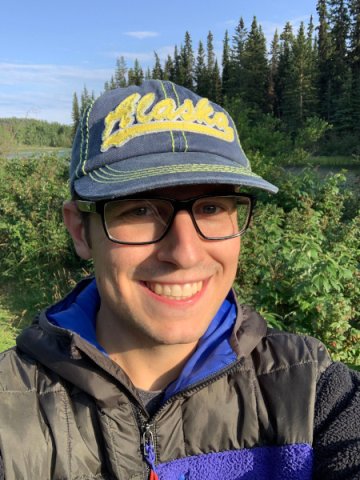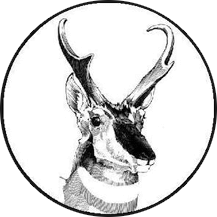About the Committee
Chair
- Angela Hornsby (asm.giar@gmail.com)
Members
|
|
|
History and Mission
The Grants-in Aid Committee was formed in 1971 (Gill and Wozencraft, 1994) to enhance and support graduate research by identifying and funding research proposals pertaining to mammals. Additionally, this committee nominates the outstanding graduate students that best meet the conditions and criteria set forth for the American Society of Mammalogists Fellowship and the Albert R. and Alma Shadle Fellowship.
2023 Albert R. and Alma Shadle Fellowship Recipient
The Albert R. and Alma Shadle Fellowship is awarded to a graduate student in recognition of current accomplishments and future potential in mammalogy. The 2023 recipient of the Albert R. and Alma Shadle award is Mauriel Rodriguez Curras of University of Wisconsin, Madison.
|
Image
 |
Mauriel Rodriguez Curras is a first-generation ecologist from La Habana, Cuba. He is broadly interested in how species interactions shape community form and function and is motivated by applying his work to contemporary conservation. He received his bachelor’s degree in Biology at the University of New Mexico, where he developed his interests in isotope ecology, physiology, and, especially, mammalogy. He received his Master’s (Fall 2019) and is currently a Ph.D. candidate in the Department of Forest and Wildlife Ecology at the University of Wisconsin-Madison, mentored by Dr. Jonathan Pauli. His Ph.D. focuses on the competitive interactions within the carnivore guild and the impacts of humans on carnivore communities. Mauriel has been a member of the American Society of Mammalogists since 2019 and has presented his results at each conference, including two projects supported by Grants in Aid of Research. He has published six articles (three as first-author) in Oecologia, Behavioral Ecology, and the American Naturalist. His ongoing research has been accepted, or is in review, at Functional Ecology, Frontiers in Ecology and the Environment, and the Journal of Mammalogy. Mauriel is incredibly grateful for his early career opportunities and aims to become a mentor to the next generation of young scientists; to date, he has mentored 12 students at various stages in their careers and from a diversity of backgrounds. |
2023 ASM Fellowship Recipient
The ASM Fellowship is the highest award made to a graduate student member of our Society. The award is intended to recognize current outstanding accomplishments in mammalogy, service to ASM, as well as the potential for a productive, future role in professional Mammalogy. The recipient of the 2023 American Society of Mammalogists Fellowship is Connor Burgin from University of New Mexico.
|
Connor Burgin grew up in Boise, Idaho, where he obtained his bachelor’s degree at Boise State University. He is currently a PhD Candidate at the University of New Mexico advised by Dr. Joseph Cook. Connor has been an active member of the ASM since he attended his first meeting in 2017 at the age of 18, becoming involved in the creation and curation of the Mammal Diversity Database, a mammal taxonomic database run by the ASM’s Biodiversity Committee, under the supervision of Dr. Nathan Upham. Through this work, Connor has published peer reviewed articles in the Journal of Mammalogy and Journal of Biogeography, and has written a number of chapters and species accounts in the Handbook of the Mammals of the World and Illustrated Checklist of the Mammals of the World series. Connor’s research interests include mammalian systematics, biodiversity, evolutionary history, phylogenetics, and biogeography and his thesis work revolves around the application of integrative taxonomic methods to estimate species boundaries across the mammalian radiation, focusing on the systematics and biogeography of Arctic collared lemmings as a case study. Funding for his work has come from grants and awards from the ASM, University of New Mexico, and Society of Systematic Biologists. Connor remains an active member of the ASM as part of the Biodiversity and Nomenclature Committees, and as the student taxonomic curator of the Mammal Diversity Database. |
Image
 |
Streaming Presentations
ASM Members can log into the Business Office site and stream presentations from past winners!
Reports
Grants & Awards
AMERICAN SOCIETY OF MAMMALOGISTS FELLOWSHIP IN MAMMALOGY
A single graduate fellowship in mammalogy is provided annually by the Board of Directors of ASM at the recommendation of the Grants-in-Aid Committee. The amount of the award for the academic year 2024-2025 has been set at $20,000. The fellowship is not a grant in support of a specific research project, but rather is intended to recognize current accomplishments in mammalogy, service to ASM, and the potential for a productive, future role in professional mammalogy. Applicants may be any graduate student members of ASM enrolled at a college or university for the forthcoming academic year and engaged in research in mammalogy. See the grants page for current application, instructions, and submission dates.
- Curriculum vita - 3-5 pages in length, but must include the following sections; peer-reviewed publications; other publications; presentations to professional meetings; research grants; memberships in professional societies; honors and awards; professional service
- Arrange for three letters of recommendation to be sent to asmfellow@mammalsociety.org. One letter must be from your research advisor. Please make sure your advisor and other providers of letters of recommendation include your name in the subject line of the e-mail.
- Names and contact information for 3 people who you have asked to provide letters in support of your applications (one of these must be your present research advisor) plus name and contact information for your department head or chairperson.
- Summary of professional experience in mammalogy, research interests, and career goals. Limited to 1 page.
- Abstract for thesis or dissertation research. Limited to 150 words.
- Brief statement describing how you would use any support from ASM. Limited to 1 page.
- Description of thesis or dissertation research project organized under the following headings: Title, Introduction, Objectives, Methods, Present Status of the Research (including preliminary results), Significance, and Literature Cited. Limited to 5 pages, double spaced, however, Literature Citations may be included on additional pages.
ALBERT R. AND ALMA SHADLE FELLOWSHIP IN MAMMALOGY
A single graduate fellowship in mammalogy is provided annually by the Albert R. and Alma Shadle Endowment Fund. The award is made by the Buffalo Foundation at the recommendation of the Grants-in-Aid Committee of ASM. Generally, the award is approximately $4,000. The fellowship is intended to promote a professional career in mammalogy by allowing the recipient greater freedom to pursue research, but is not a grant in support of a specific research project. Applicants must be enrolled as graduate students in a college or university in the United States for the forthcoming academic year and be engaged in research in any area of mammalogy. See the grants page for current application, instructions, and submission dates.
- Curriculum vita - 3-5 pages in length, but must include the following sections; peer-reviewed publications; other publications; presentations to professional meetings; research grants; memberships in professional societies; honors and awards; professional service
- Arrange for three letters of recommendation to be sent to shadle@mammalsociety.org. One letter must be from your research advisor. Please make sure your advisor and other providers of letters of recommendation include your name in the subject line of the e-mail.
- Names and contact information for 3 people who you have asked to provide letters in support of your applications (one of these must be your present research advisor) plus name and contact information for your department head or chairperson.
- Summary of professional experience in mammalogy, research interests, and career goals. Limited to 1 page.
- Abstract for thesis or dissertation research. Limited to 150 words.
- Brief statement describing how you would use any support from ASM. Limited to 1 page.
- Description of thesis or dissertation research project organized under the following headings: Title, Introduction, Objectives, Methods, Present Status of the Research (including preliminary results), Significance, and Literature Cited. Limited to 5 pages, double spaced, however, Literature Citations may be included on additional pages.
GRANTS-IN-AID OF RESEARCH
Awards are made available by the Board of Directors of the Society in amounts not to exceed $2000.00 (US) to graduate and upper-level undergraduate students who are members of the Society at the time of application. Awards primarily will be for support of field or laboratory work in any area of mammalogy, or for the purchase of supplies and small items of equipment related to such research. See the grants page for current application, instructions, and submission dates.
- Research Proposal - limited to 2 pages, 12 pt font, 0.5" margins. Literature Cited may be on a separate page.
- Itemized budget for the proposed work. Travel to meetings, salary, and living expenses will not be supported.
- Categorize each item as Equipment, Supplies, or Travel
- Indicate expected source of funds (ASM, Sigma Xi, etc.) and indicate with an "X" if you already have funds for that item.
- Give estimated total cost and amount requested from ASM.
- Arrange for one letter of recommendation from your research advisor to be sent to ASM via a link that will be provided to them in an email (you must supply an email address).
- If you have received a Grant-in-Aid of research previously, you will have to provide the year it was awarded, title of the proposal, amount awarded, status of any resulting publications, and a brief summary of progress.
- For the file attachments, please use this naming convention: "LAST NAME _ DOCUMENT TYPE" (ex. Smith_Proposal.pdf, Smith_Budget.pdf, Smith_GIA.pdf).
Recipients
ALBERT R. AND ALMA SHADLE FELLOWSHIP
presented by the Buffalo Foundation to a student enrolled in a university/college in the United States to promote a professional career in mammalogy by allowing the recipient greater freedom to pursue research
1970-1979
- 1972—James Joule, University of Houston;
- 1972—William J. Bleier, Texas Tech University
- 1973—Philip D. Gingerich, Yale University
- 1974—Patricia W. Freeman, University of New Mexico
- 1975—Thomas J. O’Shea, Northern Arizona University
- 1976—John L. Hoogland, University of Michigan
- 1977—Ira F. Greenbaum, Texas Tech University
- 1978—Kenneth D. Rose, University of Michigan
- 1979—Peter V. August, Boston University
1980-1989
- 1980—Michael A. Bowers, University of Arizona
- 1981—Gary G. Kwiecinski, Cornell University
- 1982—W. Christopher Wozencraft, University of Kansas
- 1983—Duke S. Rogers, University of California, Berkeley
- 1984—Craig S. Hood, Texas Tech University
- 1985—Robert M. Sullivan, University of New Mexico
- 1986—Cynthia E. Rebar, Kansas State University
- 1987—Kimberlyn Nelson, Harvard University
- 1988—Ronald A. Van Den Bussche, Texas Tech University
- 1989—Brett R. Riddle, University of New Mexico
1990-1999
- 1990—Robert D. Bradley, Texas Tech University
- 1991—Craig L. Frank, University of California, Irvine
- 1992—Jennifer K. Frey, University of New Mexico
- 1993—James W. Demastes, Louisiana State University
- 1994—Douglas A. Kelt, University of New Mexico
- 1995—Theresa A. Spradling, Louisiana State University
- 1996—Dawn M. Kaufman, University of New Mexico
- 1997—Link Olson, University of Chicago
- 1998—Thomas Risch, Auburn University
- 1999—Jay F. Storz, Boston University
2000-2009
- 2000—Sara Kathleen Lyons, University of Chicago
- 2001—Steven R. Hoofer, Oklahoma State University
- 2002—Christine L. Hice, Texas Tech University
- 2003—Antoinette J. Piaggio, University of Colorado, Boulder
- 2004—Jacob R. Goheen, University of New Mexico
- 2005—Sergio Solari, Texas Tech University
- 2006—Ryan Norris, University of Vermont
- 2007—Paul Velasco, University of Illinois, Chicago
- 2008—Andrew Edelman, University of New Mexico
- 2009—Brandi Coyner, Oklahoma State University
2010-2019
- 2010—Bret Pasch, University of Florida
- 2011—Justin Lack, Oklahoma State University
- 2012—C. Miguel Pinto, American Museum of Natural History and City University of New York
- 2013—Joseph R. Burger, University of New Mexico
- 2014—Nicté Ordóñez-Garza, Texas Tech University
- 2015—Silvia Pavan, City University of New York and the American Museum of Natural History
- 2016—Angela Hornsby, University of Nevada, Reno
- 2017—Brett Jesmer, University of Wyoming
- 2018—Jocelyn Colella, University of New Mexico
- 2019—Katie Stanchak, University of Washington
2020+
- 2020—Jesse Alston, University of Wyoming
- 2021—Savannah Bartel, University of Wisconsin
- 2022—Matt Snider, North Carolina State University
- 2023—Mauriel Rodriguez Curras, University of Wisconsin, Madison
AMERICAN SOCIETY OF MAMMALOGISTS FELLOWSHIP
presented to a student in recognition of current accomplishments in mammalogy, service to ASM, and the potential for a productive, future role in professional mammalogy
2000-2009
- 2001—Richard D. Stevens, Texas Tech University
- 2002—Andrew McAdam, University of Alberta
- 2003—Debra M. Shier, University of California, Davis
- 2004—Kristofer M. Helgen, South Australia Museum, Adelaide
- 2005—Jacob R. Goheen, University of New Mexico
- 2006—Sergio Solari, Texas Tech University
- 2007—Justin Boyles, Indiana State University
- 2008—Jacob Esselstyn, University of Kansas
- 2009—Jonathan Pauli, University of Wyoming
2010-2019
- 2010—Peter Larsen, Texas Tech University
- 2011—Bret Pasch, University of Florida
- 2012—Ryan Long, Idaho State University
- 2013—C. Miguel Pinto, American Museum of Natural History
- 2014—Melissa Merrick, University of Arizona
- 2015—Kayce Bell, University of New Mexico
- 2016—Bryan McLean, University of New Mexico
- 2017—Anne-Marie Hodge, University of Wyoming
- 2018—Brooks Kohli, University of New Hampshire
- 2019—No recipient
2020+
- 2020—Jonathan Nations, Louisiana State University
- 2021—Dana Green, University of Regina
- 2022—Marrisa Dyck, Ohio University
- 2023—Connor Burgin, University of New Mexico
